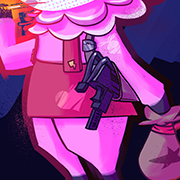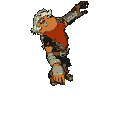|
AnElegantPeacock posted:I've been a network guy for my entire professional career. I went network because I hate coding. I decided I would try and make a game in Unity during my days off instead of spending a small fortune at the bars every weekend. Turns out, I still hate coding. Making notes and designing the game in my notebook makes the hours fly by. Messing around in Blender is great. Making pixel art with this fancy digital tablet is endlessly entertaining. Unfortunately opening up visual studio makes me cringe. Any professional coders have any tips for making it over the hump between coding being a chore and coding being something natural? Is this something I'm just going to have to beat my head against until it clicks? It was my experience that coding is really tedious until it's not. That's a pretty dumb non-answer, but bare with me for a second here. Learning how to code, especially learning your first 'real' language is just a grind and the reward is so small because literally every problem you solve you have to look up a reference for, and your reward for spending 90 minutes to learn exactly how to write the 4 lines of code you needed is that you get to do it all over again, and also 3 weeks later, you will discover that your current implementation is poo poo and you should actually do it like this... It's like the absolute worst puzzle game that has no pay-off and the puzzles never end. But then eventually you'll have collected enough knowledge and experience that you don't have to reference those same pieces of documentation for the same problem set. You'll just know how to do it and now you are only looking up solutions and implementation ideas for more esoteric problems. You still have to spend a lot of time because you are probably now in the process of solving increasingly difficult problems in code, but the problems are starting to at least get interesting. Some weeks/months pass and you start learning how to implement solutions to increasingly complicated problems without any reference. At some point, you can 'see through' an entire problem. You can think through the entire implementation without a single point of reference, and you know what data structures you'll want to use and why. Maybe you start thinking about trade-offs in your head as well while you are designing this solution. That's the point where coding became fun for me - When you can start to wield it like a weapon to solve cool and interesting problems. I went to school for Computer Science and dropped out. I hated coding for so long honestly, the homework structure didn't help. After probably a half-dozen false starts, I finally got far enough into it that I got to the point where I was solving problems and creating stuff I cared about. The first 'cool' thing I built was a simulation for the class I played in WoW at the time. Looking back at it, that code is awful and I'm not totally sure it gave me good results, but it was the first thing that was definitively mine - a problem I cared about and a solution I developed. At that point, I was off to the races and I found out I really enjoyed thinking about these problems. It's a lot more fun when you have a known set of pieces for which to solve a puzzle. It's miserable when you are still discovering what those pieces even look like, or where they begin and end. Canine Blues Arooo fucked around with this message at 19:01 on Oct 13, 2017 |
|
|
|

|
| # ? Apr 20, 2024 01:21 |
|
AnElegantPeacock posted:I've been a network guy for my entire professional career. I went network because I hate coding. I decided I would try and make a game in Unity during my days off instead of spending a small fortune at the bars every weekend. Turns out, I still hate coding. Making notes and designing the game in my notebook makes the hours fly by. Messing around in Blender is great. Making pixel art with this fancy digital tablet is endlessly entertaining. Unfortunately opening up visual studio makes me cringe. Any professional coders have any tips for making it over the hump between coding being a chore and coding being something natural? Is this something I'm just going to have to beat my head against until it clicks? I basically did tutorials until it clicked. I followed this tutorial for C# and I'd still recommend it. The whole point of it is that it just gets you writing a bunch of decent code rather than trying to fully understand it. Some of it will make sense intuitively, some won't. You'll be left with a text adventure skeleton that you'll understand enough to plug in whatever text adventure you want to make. You might even be able to create another system to go in it, which is what I did. Then just go find a Unity tutorial for a simple game that sounds mildly interesting and have some fun with it. A lot of the concepts will carry over. I still revisit that initial tutorial from time to time and I'm at the point where it all makes total sense and I can modify the final project on a whim if I want, which I've used as a nice way to track my own sense of progress as a programmer.
|
|
|
|
How and at what point do you usually come up with a name for whatever game's being made? If you think about it a lot of games have names that seem pretty random or arbitrary - but I asume this is not the case or is it?
|
|
|
|
It can be at any point but for big expensive AAA games it usually happens shortly before announce which is when the planned marketing campaign kicks off. There are a lot more things to consider when naming things these days like search engine optimization, legal availability, and even how expensive domain names will be. A lot of publishers I know will contract an expensive marketing firm to name and brand a franchise and put together a identity package including slogans and emotional statements and such for a project.
|
|
|
|
Do they get amusing production names before being officially named, or is it just whatever the producer thinks is fitting Do games ever just not get named at all until announcement, and the devs just call it "the game we're working on"
|
|
|
|
ninjewtsu posted:Do they get amusing production names before being officially named, or is it just whatever the producer thinks is fitting DOOM was code named Zion but it was used interchangeably in the office because its obviously the new DOOM game. In my studio (not id) we always give code names to projects by going through the alphabet for the first letter of a word in a category. i.e. we were on weapons, so A-Arbalest, B-Ballista, etc. Once we went through the alphabet, we pick a new category (like food) and repeat the cycle. %99 of the time we don't have a working title and a lot of the time were just exploratory projects to test a specific concept and see if that pans out.
|
|
|
|
I'd wager to guess that most games at least get a code name or a project name. You have to call it something in the code and the directory structure/filenames too. Sometimes the code name sticks though so it's best to not code your project "DORKOTRONTHEGAME" or whatever. Naming and titling turns out to actually be really challenging and we can all think of games with names that seem impossible to remember by name, so there's actually a lot of thought put into them even if they seem arbitrary or bad sometimes.
|
|
|
|
It's something I thought of because the Elder Scrolls : Arena LP mentioned how the titular elder scrolls don't even make an appearance until like the 4th game, while the Arena subtitle comes from the game originally being about a group of gladiators, that idea got ditched but they probably had to keep it because it already got used in marketing materials by time they changed the game's scope? And Doom itself is a pretty good example too since as far as names go it's pretty generic and doesn't really tell you anything about the game, of course now doom-clone is a genre on itself, makes me wonder how much a good name even matters. Can't imagine how to measure something like that, though.
|
|
|
|
ShinAli posted:%99 of the time we don't have a working title and a lot of the time were just exploratory projects to test a specific concept and see if that pans out. I just wonder in a professional setting how it comes about in say a "brawler" game like Platinum's Vanquish, the developer knows we're gonna make a brawler, is it likely someone had come up with rocket sliding around and showed it around and everyone was like "oh this is really fun sliding around and slowing down time, that could be part of the core gameplay" or is it more likely a department head just said "and we also want the guy to rocket slide everywhere, make it so!". Guess I'm kind of wondering how organic that design of the core gameplay loop comes about in different situations. revolther fucked around with this message at 21:05 on Oct 16, 2017 |
|
|
|
ninjewtsu posted:Do they get amusing production names before being officially named, or is it just whatever the producer thinks is fitting Our studio has code names for our projects, which either are named after our pets or more recently, are just thematically appropriate. One person was sad there was no animal name this time around, so when she adopted a cat she named it after the project, so now order has been maintained. Other companies I've worked at have done restaurant names, food names (CoD 4 Remaster was Bacon at the studio I worked at) or vaguely relevant-to-game titles, the latter being primarily true when working on sequels and such.
|
|
|
|
At Black Isle, we used the names of U.S. presidents. At Obsidian, we use state names. We intentionally avoid any nomenclature that's suggestive of what the games actually are since it makes it difficult to discuss them outside of the office (a few other dev houses are within a few miles of us and eat at the same places).
|
|
|
|
we use birds you guys have more fun systems
|
|
|
|
Do you call them "Project McKinley" or "the Minnesota Project" or whatever, using stern voices, as if you're working on secret government projects? 'Cause I would.
|
|
|
|
What's the interaction between the dev team and music composers on a given project? I know that back in the old days, the composer was a programmer who happened to write songs, but nowadays studios can have dedicated composers and sound engineers.
|
|
|
|
mutata posted:I'd wager to guess that most games at least get a code name or a project name. You have to call it something in the code and the directory structure/filenames too. Sometimes the code name sticks though so it's best to not code your project "DORKOTRONTHEGAME" or whatever. This is us right now. We had to name the project something, and it was the "prototype" of my "ball game" which became Protoball. We still don't have a better name and I think we'll be using this forever. Vargatron posted:What's the interaction between the dev team and music composers on a given project? I know that back in the old days, the composer was a programmer who happened to write songs, but nowadays studios can have dedicated composers and sound engineers. There are some cool parts of the No Clip Witcher Documentary that touches on how they did some music. For our tiny indie team it's been pretty casual, we get a lot of sound people requesting work, and they generally make stuff and revise it, almost as often as we want, in an effort to get in the game. We mostly provide references and I'll abstractly describe what I want the sounds to evoke, and not so much what they should sound like. I know others (maybe most others) do it differently though. RizieN fucked around with this message at 20:01 on Oct 17, 2017 |
|
|
|
typically the sound department is the most forgotten department at the studio i never talk to our sound guy about anything
|
|
|
|
I've messed around with Unity a bit and created a few very small 3d games to get a feel for physics and vectors etc, what are some things to research to get a feel for how huge RPG games are made? (baldurs gate style or even better Divinity: Original Sin 2) I'm a C# .NET dev primarily involved in finance which bores the poo poo out of me so i'm wanting to see what potential talent I have in game dev land. P.S. Divinity: Original Sin 2 should get goty2017
|
|
|
|
Baxta posted:I've messed around with Unity a bit and created a few very small 3d games to get a feel for physics and vectors etc, what are some things to research to get a feel for how huge RPG games are made? (baldurs gate style or even better Divinity: Original Sin 2) The easiest way is to look at an RPG where you can open their campaign in a publicly available editor. I don't remember but I believe this is possible with NWN1/2? IIRC. In my experience the thing that differentiates huge RPGs isn't as much about the code that runs them as the content/scripting to support the content. Single-player RPGs aren't super nutty from an engineering PoV but tend to have really complex content (again, in my experience).
|
|
|
|
Good idea. I can make my own assets (They look like poo poo) and make em move around and interact with other rigidbody things, just trying to figure out if there are any well down issues with larger scale 3d games and Unity etc. I'm hoping I dont have to go into crazy optimisation as my idea isn't fast paced but lets see how I go...
|
|
|
|
revolther posted:How much time gets spent on testing specific concepts to see if they pan out in an organized studio? Is there a dedicated team of tinkerers who come up with random concepts/mechanics and prototype it/take it for a walk see if something fun is there to build a gameplay loop around? Or is it more like folks all have those going on the back burners and show them to each other and the good stuff rises to the top? To be honest our studio doesn't really pump out a lot original work, contract work paid most of our bills before we got acquired by ZeniMax. The one project we had that had a lot of creative gameplay input from us was the PASS Time mode for TF2. Aside from that, we did have a bunch of prototypes being worked on between contract work. I think the idea from the studio heads was to accrue money from contract work so we can start of on our own project, but that never really seemed to have happened. As for who works on what, it seemed to be mostly the senior lead folks starting off on working on something and they get help from others. They get some kernel of an idea, start off on a rough prototype and studio heads determine if its worth digging into the idea further. Other times the studio heads get an idea and pick up whoever to start a prototype. That's how I got my only bit of experience working with UE4 (I seemed to have been working on every other engine other than UE4 since I got in the industry, haha). After getting acquired by big Zeni, we seem to be on much stabler ground to work on our own projects unique to this studio. EDIT: also someone from a more creative studio should answer this question for sure.
|
|
|
|
revolther posted:How much time gets spent on testing specific concepts to see if they pan out in an organized studio? Is there a dedicated team of tinkerers who come up with random concepts/mechanics and prototype it/take it for a walk see if something fun is there to build a gameplay loop around? Or is it more like folks all have those going on the back burners and show them to each other and the good stuff rises to the top? This is a great question. The short answer is: it depends on the team size. At companies like Valve and Riot, I'd say the majority of the people making game content are making small prototypes and then building small teams around them to see if they work or not, because they have the luxury of being able to do a ton of R&D work without worrying about profiting from it. Double Fine is another good example of a company that did this exclusively, at least for a little while (I don't know if it still works like that there) and a lot of cool games came out of it. Companies that can do that are the exception though, and most other developers know exactly what kind of game they want to make when they first put together a team and either have a very short playable prototype showing off the "hook" of the game or some kind of mock up / presentation in order to get it funded and developed. Companies that work this way usually have tight deadlines and budgets and therefore it's pretty rare to deviate from the initial concept / prototype once the game gets rolling. Of course happy accidents emerge during the course of development and sometimes core stuff gets thrown out or reworked if it's not fun, but most developers just don't have the time to tinker endlessly on whatever they want. For your specific example, Platinum definitely falls in the latter camp of independent developers that are constrained by budget and therefore need to pick a concept and develop it quickly, and it sounds like that's exactly what Mikami did for Vanquish. In the last few questions of this article, he talks about how he wanted to make a game that was like Neo-Human Casshern, except with a greater feeling of speed. It sounds like there was some back and forth w/r/t some of the core mechanics but they had the main idea from the genesis of the project. So it's definitely more of, as you said, "we want the guy to rocket slide everywhere, make it so!" There have been times where glitches turn into defining features of the game though. The Tribes series is probably the best example. When 3d game programming was still something of a dark art, getting characters to move consistently on slopes was actually pretty tricky, and Tribes shipped with a "bug" where jumping didn't have the correct cooldown time on slopes, so players exploited it into "skiing" across the maps. The next games in the series made it a core component of gameplay. There are also times where concurrent engine development ends up changing the theme and style of the game. In the era of per-pixel lighting (e.g. Doom 3) there was a developer who set out to make game #3 in a franchise, but it ended up becoming a new IP instead because per-pixel lighting didn't lend itself well to the size & style of levels that were in the previous games. In the era of out of the box engines like Unity and Unreal, happy accidents like those will happen less frequently. But the good thing is experimentation and weird unintended behaviors will probably always be a part of game development just by nature of the way games are made and the way coding works (or more accurately, doesn't work)
|
|
|
|
Do you believe there is a dividing line between genius and insanity and how many sides of it is Tarn Adams on?
|
|
|
|
Discendo Vox posted:I once considered calling into one of those orderup-type places and buying my favorite game's devteam a ton of pizza. Goonfleet once had a cake delivered to one of the EVE team leads. During his birthday party. In an off-the-grid campground in bumfuck Iceland.
|
|
|
|
shame on an IGA posted:Do you believe there is a dividing line between genius and insanity and how many sides of it is Tarn Adams on? Genius. He was part of a GDC talk on procedural generation in 2016 that was incredibly fascinating the whole way through. Chunderstorm fucked around with this message at 23:56 on Oct 20, 2017 |
|
|
|
It was very weird to show up at the moma in New York and see dwarf fortress in an exhibit and be able to look at it and understand it. How hard is vr development beyond normal 3d game dev? What are its particular challenges?
|
|
|
|
Phobeste posted:It was very weird to show up at the moma in New York and see dwarf fortress in an exhibit and be able to look at it and understand it. Performance, level design and interaction design are the big challenges. It's not much harder for any reason other than performance, but it's a bit tricky overall because as developers we're still figuring out a lot of what works and what doesn't. At Owlchemy we've figured out a fair amount, but even though we manage to ship 90FPS games that people enjoy, it takes a ton of work to get to that point. All our low-level code has to be super performant to get it to run that smoothly. We've gotten pretty good at developing interactions, but that's because we spent a lot of time prototyping, playtesting, etc. We figured out pretty early on that artificial locomotion isn't something we want to work with, since making any of our players nauseous potentially ruins the experience for them, and in a medium as small as VR, isolating your playerbase at all is a bad idea. That means that we're generally limited to a single playspace, or require some form of discrete teleporting like in Rick & Morty VR. Our CEO and CTO actually just did a great talk at VRDC about some of the dev problems we had to solve, and that doesn't even really get into the "oh god this area only hits 70 FPS" stuff we had to deal with.
|
|
|
|
Phobeste posted:How hard is vr development beyond normal 3d game dev? What are its particular challenges? I can speak on this from a system programming perspective of porting a big, existing game to VR. On the whole it's not much harder other than dealing with unknowns (movement options, how to quell VR sickness, etc). If you're using a pre-existing engine that has VR support, you're relatively well off on technical challenges. You still have to be very concerned with performance, so you can't really throw effects at the GPU that take an significant amount of time, but I would wager that you hopefully don't have to dig about engine guts. It's a different story porting an existing game, whose engine never even thought of VR in the first place. We've been working on a game that was locked 30fps, which we had to push up to 60fps on PS4 for PSVR. Ideal framerate for PSVR would be 120fps but that was impossible without having significantly more time. We've had to do a variety of things; essentially re-ordering multithreaded work, implement new performance saving systems (I've implemented occlusion culling that was able to shave of 4ms), etc. We hit our target, but now we had a whole host of new crashes and bugs to fix because lol multithreaded programming loving sucks. Even then, we had to fix hitches and such that was just part of the normal game and never really fixed because they were barely perceptible when playing from a TV or monitor, but you'd definitely feel a 100ms hitch when bobbing your head about in VR. This usually meant we have to mess with more threads because the hitch happens when some system is either waited or worked on the main thread, which then lead to new crashes and etc. PSVR in particular is a bit more challenging than PC VR libraries. With PC, you usually just hook into the library and tell it to go, and you get back your HMD and wand position/rotation information. With PSVR, you have to make it a part of your game, giving it a dedicated thread that would kick off processing work. The lowest level of it really is just calculating the correct information and kicking off work at a particular rate, but its a little difficult to do it properly the first time around with no tooling as SDK docs are usually terrible. Thankfully, Sony released actual VR tools just recently. Gameplay programming wasn't much different from normal, other than having to deal with math more than usual when you're messing with systems tied to the player's view or hand wands/controllers/whatever.
|
|
|
|
To cap the previous posts, I worked on castAR which was like a babby's first AR platform kind of tech and that added a host of new challenges to think of, but one that it shared with VR was accessibility. Making games accessible to people with various physical differences is a challenge with conventional games, but with VR/AR where the player's physical existence is acknowledged in-game, it can be a really hard problem to crack. There's a little free Star Wars experience for VR where you have to fiddle with some bits of the Millennium Falcon by pressing in-game buttons and such. I've watched several of my nieces and nephews play it and some of them literally couldn't reach some of the buttons! I also have a friend with limited vision in one eye so the stereoscopic 3d on any of these platforms just straight up doesn't work for him. My other friend is in a wheelchair but otherwise fine so a lot of the VIVE room-space experiences don't really do much for him. On the other hand, real-world solutions work in VR too to a degree, like getting a stool to stand on to raise the player character's height, but that can be dangerous, obviously. So as far as design goes, when you're inviting the player to be physically present in your game space, you start to run into some interesting issues where you really have to start thinking like a theme park ride designer or something as if you were really creating a physical space. mutata fucked around with this message at 19:26 on Oct 23, 2017 |
|
|
|
So I've been working on a solo project in Unity for the past year or so, I'm about 80% of the way done with my prototype right now, it's been one hell of a learning journey. While I'm definitely nowhere near a real gamedev, I feel as I can speak to what it's like doing a solo Unity hobbyist project. I'd like to throw out a few tips to would be other people considering doing solo projects. -Know what you're making, and who you're making it for. Keep the scope clear, limit it where it needs to be. Be able to explain what you're making in a single sentence. Keep the primary system of whatever you're trying to do as straightforward as possible. -Set reasonable goals, both overall and in the short term Something that was really important in keeping my momentum in working on the project was working part by part. Setting a broad goal of "I want this whole part of the scene done by the end of the month!" really didn't work for me by itself, but working day by day, slowly building out the various systems, acquiring the needed assets, and getting them working in the scene was great. Each step provided its own feeling of victory. Doing at least one 'thing' every day, kept the energy going. -Spend as little time modeling in Blender as possible, don't be afraid to buy assets. Modeling is hard, really hard, and time intensive. Assets are actually wicked cheap and blender is a harsh mistress. To illustrate this, here's a screenshot from my prototype (with the UI disabled)  Not exactly award winning, but fine for a prototype. How much did the assets used here cost? $70, well worth the expense. Time is your most valuable commodity here, and you can't afford to get bogged down. Less than that when I bought them though, because as I found out the unity store has sales in much the same way steam does. If you favorite the assets you think you'll be wanting later, you'll be notified when a sale happens on them. Now, when I was first putting the scene together, I spent a weekend working on the player's ship in blender. What was the best I could come up with?  Woah, move over CIG there's a new jpg spaceship king in town! Know your modeling limits, I would honestly say only model what you have to. I especially enjoy that the money I used to buy the assets I used here came from when I got rid of my star citizen stuff, so I effectively went from jpeg ships I couldn't do anything with to fully modeled and textured ships that I can do whatever the hell I want with. Also if anyone has recommendations for cheap/free modeling software I'm all ears. There has to be something out there easier yet powerful enough for this than Blender. There has to be something filling the space between, say, the Spore editors and Blender. Anyway if you're like me in your project flow, you're also only using blender every once in a while, so you have to look up all the important hotkeys every time too, in general it feels like Blender has more of a learning mobius strip than a learning curve. -95% of anything you want to do will likely have an associated post on Unity Answers If you find yourself hitting a knowledge wall, there's a wealth of information out there from others trying to do what you're doing , failing, and getting the right answers. Usually within the first 3 google results even. -Unity has come a long, long way since 2014 I made my first unity prototype in 2014, it was interesting but not something I wanted to pursue further. In the time since then, Unity has added a whole slew of features that impressed me, particularly the new Canvas UI system, the standard shader, and now the camera controlling Cinemachine. I'm sure other engines have these kinds of tools and more, but I am particularly happy with how Unity has shaped up as an engine. -Most of all, just go for it! Perhaps more than any other activity I've done for fun have I found Unity game development rewarding. Seeing ideas come to fruition that you've had for a long time, the visions mentioned earlier in the thread, is an amazing feeling. When the pieces finally start fitting together right you really start to understand the core value of what you're making, and see how it can work, and even what it could become. Unity is free, and with assets being as cheap as they are, the only real thing at risk is your time, and it's well worth the risk in my opinion. evilmiera posted:Speaking of surveys, what are the rules for posting forms and surveys regarding game dev projects on SA these days? Something that's been banned or does it require talking to a mod? On another note does anybody have any tips on trying to get licensed Music for games? I have a track in mind that I'd love to try to license, but I'm not sure how that process goes. Sardonik fucked around with this message at 05:18 on Oct 28, 2017 |
|
|
|
Sardonik posted:So I've been working on a solo project in Unity for the past year or so The Making Games thread might be a better place for development tips. Sardonik posted:-Spend as little time modeling in Blender as possible, don't be afraid to buy assets. Counterpoint: Taking time to learn modeling is incredibly rewarding. I can pump out models a lot faster with Blender than when I started using it. I've only done free stuff (read modding) with a 0 budget though, so buying assets hasn't really been an option. I don't know of any easier to use modeling tools, but for texturing, Substance Painter is a huge productivity boost over using an image editor (it's relatively cheap as well). Related Q: What do you devs feel about using a lot of bought assets? Especially with a ton of straight up asset flips being released on Steam every day, there seems to be a danger of players recognizing assets from other games.
|
|
|
|
Rectus posted:Related Q: What do you devs feel about using a lot of bought assets? Especially with a ton of straight up asset flips being released on Steam every day, there seems to be a danger of players recognizing assets from other games. Licencing music is 100% the way to go for an indie team on a budget unless someone on your team is already a musician. If you can licence graphics without them looking poo poo, then go for it, but its harder to find suitable stuff.
|
|
|
|
What are some games that inspire you? Personally, Persona 3, 4 and 5 are games that inspire me and make me want to become an art director someday. I would love to create something that looks that cool. I'm just a fledgling graphic designer, who will likely never work in games, but if I had a couple million bucks kicking around, it would be tempting to have my dream Persona-style game made. It's not something I could ever make on my own, so it's just a pipe dream that I will gradually work on as a silly little comic. I really like interesting visuals, good character design and great music in games. Breath of the Wild is another game that I found really stunning, both visually and from a world-building and gameplay perspective. It's something that could have gone so terribly terribly wrong, but it wound up being super charming and well crafted.
|
|
|
|
Overwatch inspires me visually as an artist, there's an upbeat colourful optimism to the artwork that is rare to see. Everybody's Gone To The Rapture is an incredible exercise in detailed worldbuilding. But Undertale helped bring me out of a particularly bad depressive episode and got me creating art again, that takes it for me. God I love that game.
|
|
|
|
AnElegantPeacock posted:I've been a network guy for my entire professional career. I went network because I hate coding. I decided I would try and make a game in Unity during my days off instead of spending a small fortune at the bars every weekend. Turns out, I still hate coding. Making notes and designing the game in my notebook makes the hours fly by. Messing around in Blender is great. Making pixel art with this fancy digital tablet is endlessly entertaining. Unfortunately opening up visual studio makes me cringe. Any professional coders have any tips for making it over the hump between coding being a chore and coding being something natural? Is this something I'm just going to have to beat my head against until it clicks? you're going to have to build an interest in the programming language itself for programming to be fun, and more than that you have to be interested in computer science a bit. i recommend taking a unique course that's now available online from israel, like below: http://nand2tetris.org do it whenever you can and at your own leisurely pace, and hopefully, given the knowledge from doing these very practical activities you'll find thinking like a programmer a lot less cumbersome. trust me, when you get good at programming and hold an interest in the greater field of computer science, you'll feel like you can now harness the arcane skill of programming and algorithms to build anything you can dream of, and maybe get a little bit closer to being like john carmack. it's a plus if you can think mathematically, and understand time management well if you're actually work on big projects solo. also the skills to not procrastinate and make steady progress so that you can make steady progress. e: and to get used to the tools you're going to use like visual studio and unity, you can check out things like online tutorials and even videos from conventions, maybe even go to a few cons if possible. stay connected to the greater community that uses the programming tools you use. Fututor Magnus fucked around with this message at 15:05 on Oct 31, 2017 |
|
|
|
What community management tools would it be most helpful to add to steam to deal with the black pit of waste that is its community forums?
|
|
|
|
Discendo Vox posted:What community management tools would it be most helpful to add to steam to deal with the black pit of waste that is its community forums?
|
|
|
|
how much do you devs play video games? does making video games consume all your free time? do you try to "check out the competition" or do you just play whatever is fun to you? i recall a story about how, before making the xcom remake, the xcom team at firaxis were all required to play through the original game. how often does playing other games come up at work?
|
|
|
|
Videogames do take up a big chunk of my free time, when I'm not doing other stuff with my life and working on personal art projects. I don't play Minecraft in my free time and there's never been pressure to research competition.
|
|
|
|
ninjewtsu posted:how much do you devs play video games? does making video games consume all your free time? do you try to "check out the competition" or do you just play whatever is fun to you? I play Dota 2 and Rocket League in my spare time, and usually some single-player thing. I basically don't touch VR outside of work unless something really cool has come out, but it's hardly a thing I dive into willingly. I got into dev because games were my hobby and that basically hasn't changed, but I've picked up a couple more hobbies just to feel a bit more varied in life.
|
|
|
|

|
| # ? Apr 20, 2024 01:21 |
|
ninjewtsu posted:how much do you devs play video games? does making video games consume all your free time? do you try to "check out the competition" or do you just play whatever is fun to you? a few devs (indie) told me they play video games a lot differently now, they try to understand the game design rather than just play for their own enjoyment. caring not only for the "what" of a game, but also the how of its implementation. though you should have a varied number of hobbies, since it will enrich you and your craft.
|
|
|



































